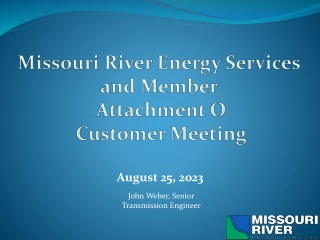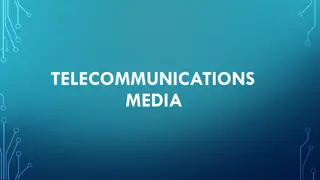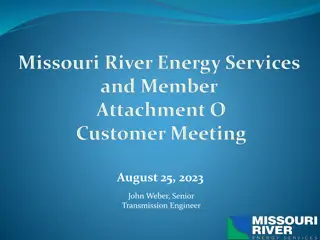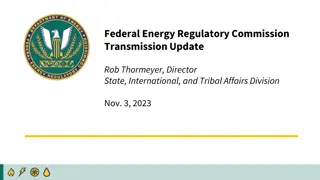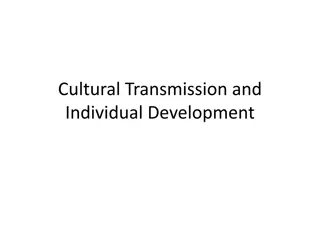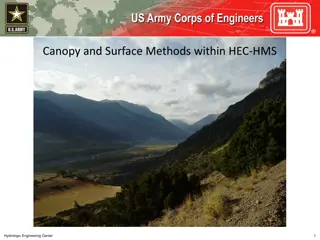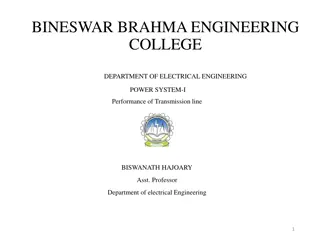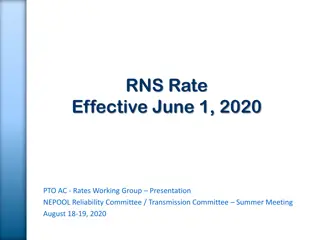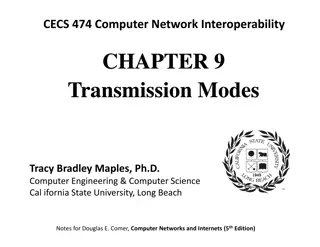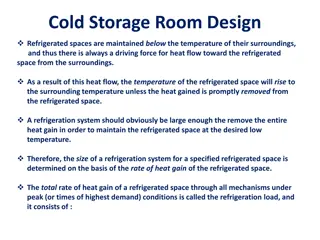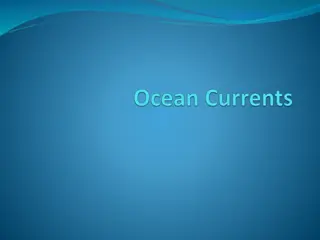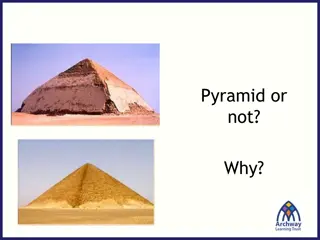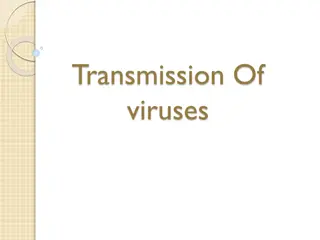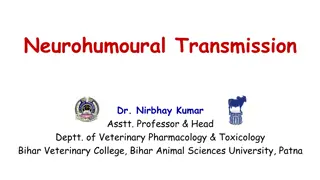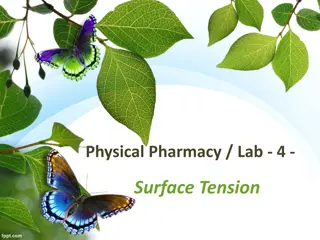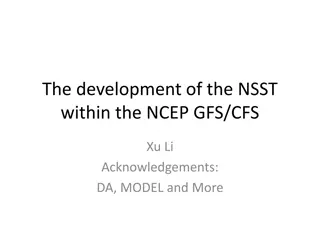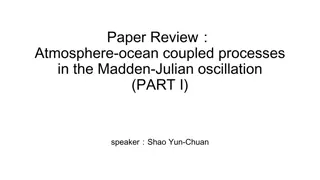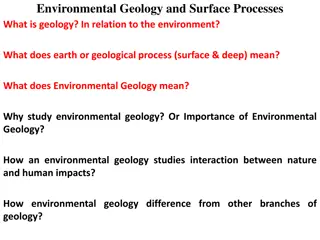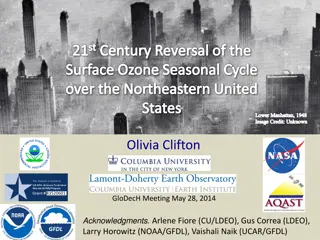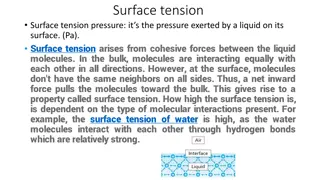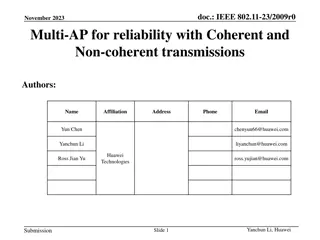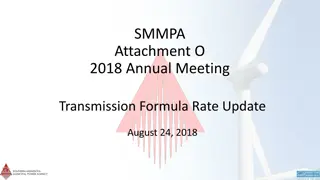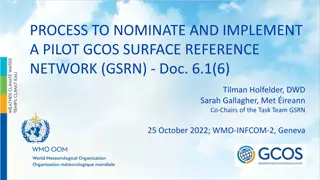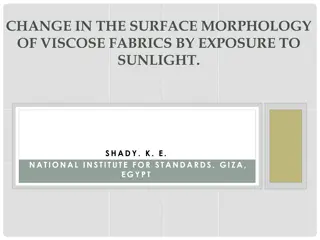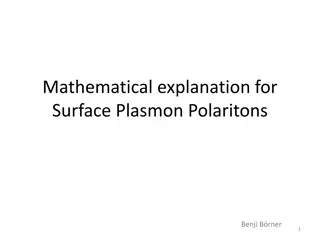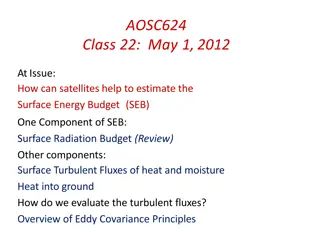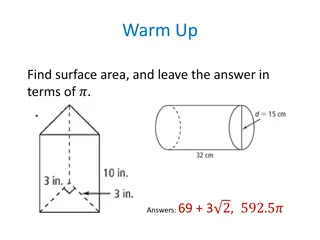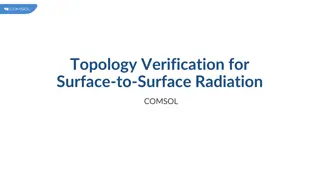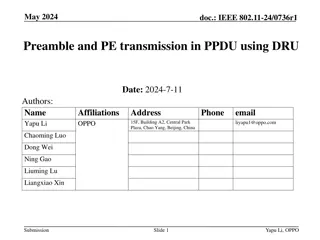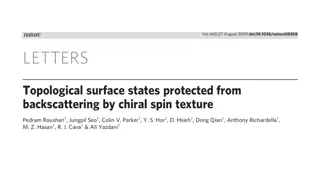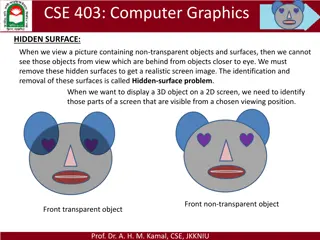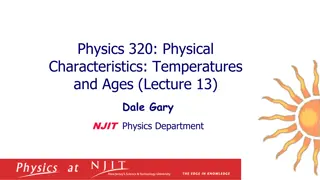MRES Transmission Update: Projects, Rates, and Regulatory Changes - August 25, 2023
Explore the latest updates on MRES transmission projects, rate adjustments, and regulatory developments discussed during the meeting on August 25, 2023. Details include MRES member rate information, specific rate adjustments for MMU and WMU, transmission project energization, true-up information, an
1 views • 15 slides
Exploring Surface Tension and Wettability in Nature
Discover the fascinating world of surface tension and wettability through engaging experiments and observations, from water cohesion on a penny to the microscopic structures on lotus leaves. Delve into the role of cohesion and adhesion, surface wettability factors, and everyday applications of these
2 views • 17 slides
Understanding Surfaces and Interfacial Energy in Chemistry
Surfaces play a crucial role in free energy and dissolution processes, impacting surface tension and interfacial energy. Learn about the adsorption of molecules, surface excess properties, and the contributions of surface area and curvature to surface energy. Dive into concepts such as Laplace's equ
6 views • 71 slides
TELECOMMUNICATIONS MEDIA
Telecommunications is the electronic transmission of information over distances, including voice calls, data, text, images, and video. It encompasses a range of technologies like fiber optics, satellites, telephones, and the Internet. Components of a telecommunications network include terminals, int
5 views • 13 slides
MRES Transmission Project Updates and Regulatory Overview
John Weber, Senior Transmission Engineer, presents key updates on MRES transmission projects, including the energization of the Lorain Substation and recent restoration efforts post-tornado strike at Elbow Lake Substation. The meeting agenda covers MRES member rate information, regulatory changes, a
1 views • 15 slides
Federal Energy Regulatory Commission Transmission Update - Nov. 3, 2023
FERC, led by Director Rob Thormeyer, regulates natural gas wholesale facilities, interstate pipelines, onshore LNG facilities, wholesale electric market rates, and more. The Commission consists of five appointed Commissioners overseeing key initiatives like transmission planning proposals and interc
0 views • 14 slides
Understanding Cultural Transmission and Individual Development
Cultural transmission plays a crucial role in perpetuating features across generations through processes like enculturation and socialization. It involves the transmission of values, beliefs, and skills from parents and peers, shaping individual development. The interaction between biological and cu
0 views • 40 slides
Understanding Canopy and Surface Methods in HEC-HMS
Explore the various canopy and surface methods utilized in HEC-HMS for managing water resources. Learn about canopy interception, evapotranspiration, common parameter values, and factors affecting losses. Delve into available methods, canopy storage values, and surface depression storage. Enhance yo
0 views • 12 slides
Understanding Performance of Transmission Lines in Electrical Engineering
The performance of a transmission line in power systems is critical for efficient operation. Factors such as voltage drop, line losses, and transmission efficiency are key considerations in design and operation. The line parameters of resistance, inductance, capacitance, and shunt conductance play c
2 views • 26 slides
Transmission Rate Change Overview for June 1, 2020
Presentation on the Rate Change effective June 1, 2020, detailing RNS Rate adjustments, Annual Transmission Revenue Requirements, and Regional Forecasts. The RNS Rate increased to $129.26/kW-year reflecting transmission project impacts, while ATRR analysis showed changes in revenue requirements for
0 views • 25 slides
Understanding Transmission Modes in Computer Networks
Transmission modes in computer networks can be divided into serial and parallel modes. Parallel transmission allows multiple bits to be sent simultaneously over separate media, while serial transmission sends one bit at a time. The choice between serial and parallel transmission depends on factors s
0 views • 13 slides
Understanding Runoff in Surface Water Systems
Runoff, the flow of precipitation and other contributions in surface streams, plays a crucial role in watershed systems. It encompasses various sources such as surface runoff, interflow, and base flow. Surface runoff, which travels over the ground surface to channels, is influenced by factors like s
1 views • 27 slides
Understanding Refrigeration Load and Transmission in Cold Storage Room Design
Refrigerated spaces require a sufficient refrigeration system to remove heat gain and maintain low temperatures. The refrigeration load includes transmission, infiltration, product, internal, and equipment loads. Transmission load depends on materials, construction, surface area, and temperature dif
1 views • 25 slides
Understanding Ocean Currents and Effects
Ocean currents play a crucial role in the movement of water across the Earth's surface. Wind-driven surface currents, influenced by the Coriolis effect, move water horizontally and impact climate patterns worldwide. Major currents extend deep below the surface and can move rapidly, while rip current
0 views • 14 slides
Exploring Surface Area in Mathematics
Delve into the concept of surface area as an essential mathematical topic, understanding its significance in everyday life and its application in various 3D shapes. Learn how to calculate surface area for different space figures like prisms and pyramids through step-by-step methods. Engage with esse
6 views • 21 slides
Exploring Pyramid Geometry for Surface Area Calculations
Delve into the concept of surface area calculations for pyramids, ranging from identifying fake pyramids to determining the surface area of iconic structures like the Great Pyramid. Learn about the essential information needed, such as base length and slant height, to derive accurate measurements. D
0 views • 32 slides
Understanding the Transmission of Viruses: Routes and Implications
Viruses are intracellular parasites that require transmission to a new host to evade immune responses. This transmission process, whether through respiratory droplets, fecal-oral routes, or sexual contact, is crucial in the viral life cycle. Different modes of transmission, such as horizontal and ve
0 views • 11 slides
Understanding Neurohumoural Transmission in Veterinary Pharmacology
Neurohumoural transmission in the field of veterinary pharmacology involves the communication of nerve messages through the release of chemical messengers. This process includes axonal conduction and junctional transmission. The historical aspects of neurohumoural transmission highlight key discover
5 views • 11 slides
Understanding Surface Tension in Physical Pharmacy Lab
Surface tension is a crucial concept in physical pharmacy lab dealing with gas-solid or gas-liquid interfaces. It refers to the force per unit length required to balance the inward pull on the surface. Interfacial tension, cohesive forces, and adhesive forces play significant roles in determining su
0 views • 16 slides
Understanding Near-Surface Sea Temperature Development in NCEP GFS/CFS
This informative piece delves into the evolution of Near-Surface Sea Temperature (NSST) within the NCEP GFS/CFS, discussing its significance in Numerical Weather Prediction (NWP) systems, the utilization of sea surface temperature (SST), and the T-profile near the sea surface. It covers the role of
0 views • 28 slides
Understanding Atmosphere-Ocean Coupling in Madden-Julian Oscillation
Atmosphere-ocean coupled processes in the Madden-Julian Oscillation (MJO) play a crucial role in intraseasonal oscillations. This paper review by Shao Yun-Chuan explores how the ocean's Sea Surface Temperature (SST) influences surface fluxes, MJO convection, and energy balance dynamics. It delves in
0 views • 17 slides
Understanding Environmental Geology and Surface Processes
Geology in relation to the environment involves studying Earth's geological processes, both surface and deep, and their impacts on nature and human activities. Environmental geology focuses on the interaction between humans and the Earth's near-surface environment, addressing hazards like erosion, f
0 views • 71 slides
Surface Ozone Seasonal Cycle Reversal Study in Northeastern United States Lower Manhattan
Study on the reversal of the surface ozone seasonal cycle over Northeastern United States Lower Manhattan, analyzing the impact of NOx and VOC emissions on Surface O3 levels. Research shows a 26% decrease in regional NOx emissions leading to changes in the seasonal cycle of surface ozone concentrati
0 views • 24 slides
Understanding Surface Tension in Physical Pharmacy Lab
Surface tension is a critical aspect in physical pharmacy lab experiments, involving the study of forces at gas-solid or gas-liquid interfaces. It is the force per unit length required to counterbalance the net inward pull on a surface. The concept extends to interfacial tension, cohesive and adhesi
0 views • 21 slides
Understanding Surface Tension: Properties, Measurement Methods, and Calculations
Surface tension is the pressure exerted by a liquid on its surface due to cohesive forces among molecules. The measurement methods include the liquid rise in a capillary tube technique, drop weight method, and bubble pressure method. The surface tension coefficient can be calculated using the equati
0 views • 12 slides
Multi-AP for Reliable Wireless Transmission with Coherent and Non-coherent Technology
In this IEEE 802.11-23/2009r0 document, the concept of Multi-AP coordination is discussed to achieve Ultra High-reliability (UHR) goals. The use of both Coherent Joint Transmission (JT) and Non-coherent transmission technologies is explored for improved reliability and performance in wireless commun
0 views • 16 slides
SMMPA Annual Meeting Transmission Rate Update 2018
SMMPA, a not-for-profit political subdivision in Minnesota, updated its transmission rate formula in August 2018. The Attachment O timeline outlines crucial dates for stakeholders, including the annual meeting on formula rate updates. SMMPA, as a Transmission Owner in MISO, follows FERC-approved tem
0 views • 8 slides
Understanding Surface Chemistry and Adsorption Phenomena
Surface chemistry is a crucial branch of chemistry that focuses on the chemical processes occurring at interfaces between different surfaces like solid-liquid, solid-gas, and liquid-gas. This field plays a significant role in various industries, including electronics. Adsorption, absorption, and sor
0 views • 15 slides
Understanding Surface Chemistry and Adsorption Phenomenon
Surface chemistry explores the interactions that occur at surfaces and interfaces, with adsorption being a key phenomenon. Adsorption involves the concentration of molecules on a surface, with adsorbents and adsorbates playing crucial roles. Desorption, the opposite process, removes adsorbed substan
1 views • 21 slides
Establishment of GCOS Surface Reference Network (GSRN) Pilot Phase
The establishment of the GCOS Surface Reference Network (GSRN) Pilot Phase aims to improve the accuracy, stability, and comparability of surface observations for Essential Climate Variables (ECVs). The GSRN will serve as the reference network for surface observations, providing data traceability and
0 views • 7 slides
Proposed Amendments to GRIDCO Regulations for Transmission Charges
The proposed amendments to the CERC regulations aim to alleviate the burden of transmission charges on GRIDCO and consumers in Odisha. The amendments focus on the sharing of inter-state transmission charges and losses, including the substitution of LTA/MTOA with GNA for sharing transmission charges.
0 views • 7 slides
Changes in Viscose Fabric Surface Morphology Due to Sunlight Exposure
This study explores the impact of sunlight exposure on the surface morphology of viscose fabrics. Direct exposure to sunlight for 120 days during summer showed significant changes in fiber surface depressions. The observed damage in mechanical properties correlated with alterations in surface morpho
0 views • 11 slides
Mathematical Insights into Surface Plasmon Polaritons
This mathematical explanation delves into the intricacies of surface plasmon polaritons, covering Maxwell's equations, wavenumbers, bulk and surface plasmon-polariton formulations, medium considerations, excitation conditions, losses, and matching examples with air, gold, and sapphire prisms. Detail
0 views • 13 slides
Satellite Applications in Estimating Earth's Surface Energy Budget
Satellites play a crucial role in estimating the Surface Energy Budget (SEB) by providing data on various components such as Surface Radiation Budget and Surface Turbulent Fluxes. The SEB includes factors like net radiation flux, sensible and latent heat fluxes, and subsurface heat transfer. Satelli
0 views • 38 slides
Geometry Concepts for Surface Area Calculations
Explore various geometric shapes such as pyramids and cones to calculate surface area. Learn the differences between prisms and pyramids, understand the importance of altitude and slant height in pyramids, and differentiate between lateral and surface areas. Practice finding lateral and surface area
0 views • 16 slides
Surface-to-Surface Radiation Verification and Boundary Detection in COMSOL
Explore the verification of surface-to-surface radiation setups in COMSOL, detecting incorrect radiation configurations with nonradiating boundaries. Learn how to identify and resolve nonradiating boundaries, ensuring accurate and effective radiation simulations. Discover the importance of selecting
0 views • 10 slides
Preamble and PE Transmission in PPDU Using DRU
The document discusses the transmission of Preamble and Physical End with the DRU technology in PPDU for IEEE 802.11 networks. It covers various aspects such as legacy preamble, UHR-STF, UHR-LTF, PE fields, and SIG transmission. The focus is on achieving compatibility and performance efficiency in D
0 views • 13 slides
Surface Analysis of STM Bi0.92Sb0.08(111) with Spectroscopic Techniques
Explore the surface properties of STM Bi0.92Sb0.08(111) using advanced spectroscopic methods such as dI/dV mapping, QPI patterns, JDOS, SSP, Spin Selection Probability, ARPES, FT-STS, charge inhomogeneity, scattering of surface states, and spatial fluctuations of momentum. The images provide a detai
0 views • 10 slides
Hidden Surface Removal in Computer Graphics
In computer graphics, the hidden-surface problem refers to identifying and removing surfaces that are not visible in a given view to create a realistic screen image. Different methods like Depth Buffer (Z-Buffer) and Scan-Line are used to address this issue by determining the closest visible surface
0 views • 14 slides
Understanding Surface Temperatures and Albedo in Planetary Systems
Surface temperatures and albedo play significant roles in understanding planetary characteristics. Albedo, the fraction of sunlight reflected from a planet's surface, varies among planets. By considering factors like albedo, distance from the Sun, and energy flux, we can estimate surface temperature
0 views • 10 slides
